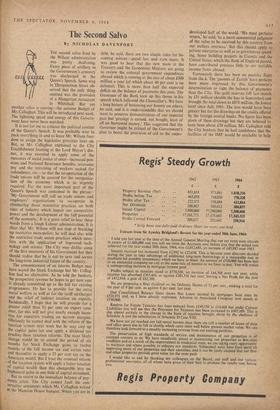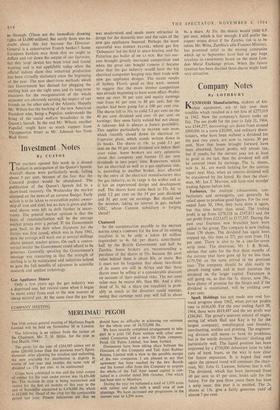The Second Salvo
By NICHOLAS DAVENPORT
THE second salvo fired by the Wilson administration
It is not for me to criticise the political content of the Queen's Speech. It was probably wise to pack everything in and to leave Mr. Wilson free- dom to assign the legislative priorities later on. But, as Mr. Callaghan explained to the City Establishment feasting at the Lord Mayor's din- ner, it was essential to apply some of the measures of social justice at once—increased pen- sions and National Insurance benefits, severance pay and the retraining of workers sacked for redundancy, etc.—so that the co-operation of the trade unions will be assured for the reorganisa- tion of the economy which is so urgently required. Far the most important part of the Queen's Speech was contained in the phrase: 'My Government will call on trade, 'unions and employers' organisations to coroperate in eliminating those restrictive practices on both sides of industry which impair our competiae power and the development of the full potential of the economy.' It is a great relief to hear these Words from a tough Labour administration. It is clear that Mr. Wilson will not stop at breaking up restrictive monopolies; he will deal also with the restrictive trade union practices which inter- fere with the application of improved 'tech- nology and science. The City may dislike some of the first measures of his Government but they should realise that he is out to save and secure the long-term industrial future of the country.
The announcement of an interim Budget may have scared the Stock Exchange but Mr. Callag- han had no alternative. As he told the bankers, the prospective revenue he hopes to get next year Is already committed up to the hilt for existing Programmes. He has to provide for the extra social welfare as well as for the tariff surcharges and the relief of indirect taxation on exports. Incidentally, I hope that he will provide for a greater relief than l per cent on export turn- over, for this will not give nearly enough incen- tive for exporters trading on narrow margins. Obviously he cannot deal with the reform of the taxation system next week but he may step up the capital gains tax and apply a dividend tax Pending these taxation reforms. The most likely change would be to extend the period of six months for Stock Exchange gains to twelve months at the full income tax and surtax rates and thereafter to apply a 25 per cent tax on the American model. But I trust the eventual reform Of the taxation system will apply a fairer taxation of capital wealth than this changeable levy on haphazard gains in one field of capital increment.
But to return to the immediate balance of pay- ments crisis. The City cannot fault the con- servative sentiments which Mr. Callaghan voiced at the Mansion House banquet. When you are in debt, he said, there are two simple rules for be- coming solvent—spend less and earn more. It was good to hear that the new team at the Treasury -and the Economics Ministry are going to review the colossal government expenditure abroad which is running at the rate of about £500 million a year (of which about 40 per cent is on defence). This is more than half the expected deficit on the balance of payments this year. The Governor of the Bank took up this theme in his speech which followed the Chancellor's. We have a long history of bestowing our bounty on others, he said, and it is understandable that we should want to preserve demonstrations of our imperial past but 'prestige is earned, not bought, least of all on borrowed money.' This suggested that the Governor might be critical of the Government's plan to boost the provision of aid to the under- developed half of the world. 'We must perforce return,' he said, `to a more commercial judgment of the value to be received by this country from our outlays overseas.' But this should apply to private enterprise as well as to government spend- ing. Some building projects in Canada and the United States, which the Bank of England passed, have contributed precious little to our invisible income from abroad.
Fortunately there has been no panicky flight from the £. The 'gnomes of Zurich hme perhaps been more impressed by this Government's determination to right the balance of payments than the City. The gold reserves fell last month by £31 million (double the loss in September) and brought the total down to £876 million, the lowest level since July 1961. The loss would have been greater but for the drawings on the credits offered by the foreign central banks. No figure has been given of these drawings but they are believed to have been about £50 million. Mr. Callaghan told the City bankers that he had confidence that the facilities of the IMF would be available to help
us through. (These are the immediate drawing rights of $.1,000 million). But surely there was no doubt about this just because the Director- General is a conservative French banker? Some European bankers may think that we ought to deflate and cut down the output of our factories, but this 'stop' device has been tried and found wanting and is not applia'able today when the official indices show that industrial production has-been virtually stationary since the beginning of the year. The new short-term methods which this Government has devised for plugging the sterling leak are the right ones and its long-term measures for the reorganisation of the whole economy are obviously earning the respect of our friends on the other side of the Atlantic. Happily Mr. Wilson has the backing of the new American President who, being a Populist, understands the firing of the social welfare broadsides in the Queen's Speech. In the end Mr. Wilson, another Populist', might have as much support from Throgmorton Street as Mr. Johnson has from Wall Street.

































 Previous page
Previous page